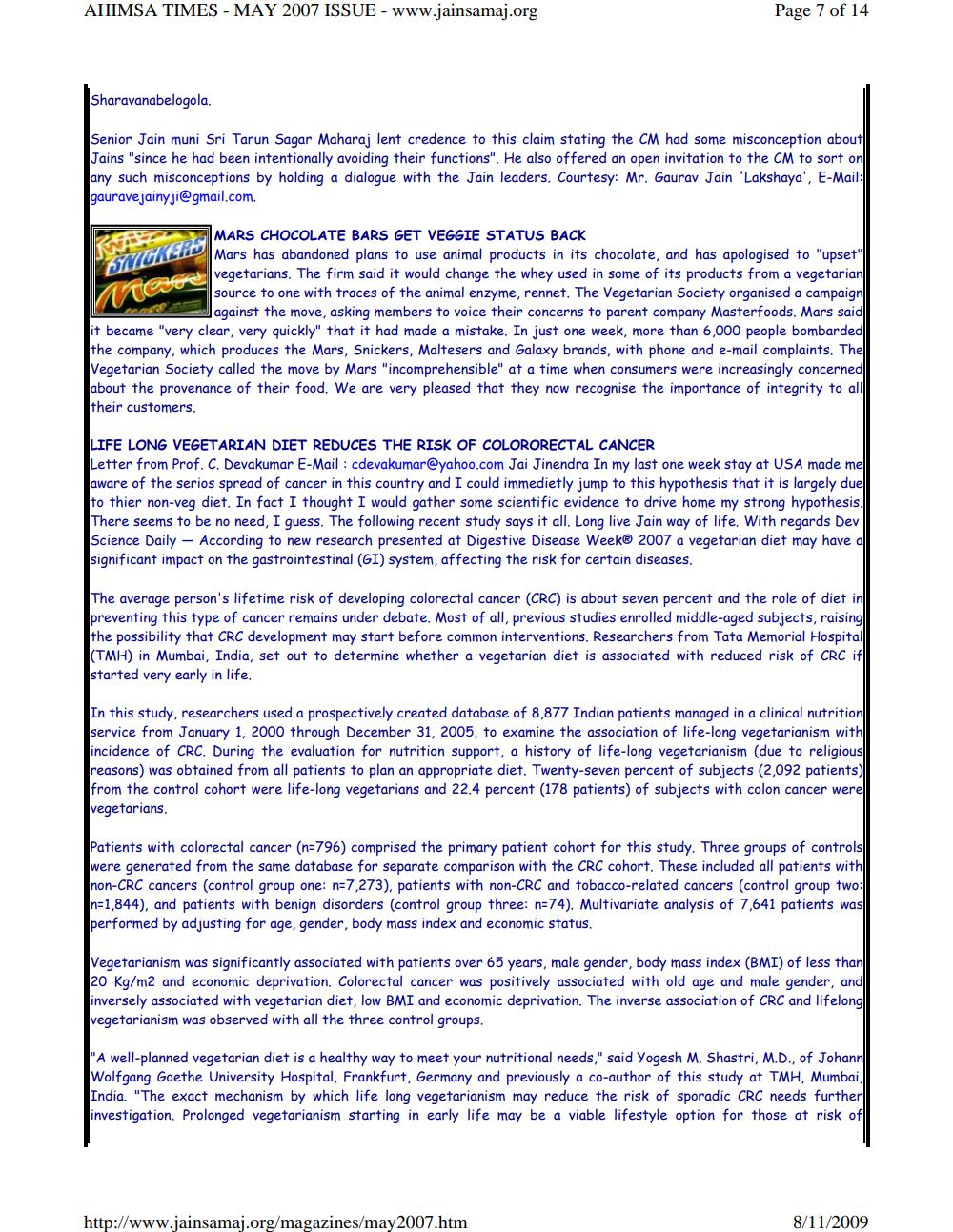________________
AHIMSA TIMES - MAY 2007 ISSUE - www.jainsamaj.org
Page 7 of 14
Sharavanabelogola.
Senior Jain muni Sri Tarun Sagar Maharaj lent credence to this claim stating the CM had some misconception about Jains "since he had been intentionally avoiding their functions". He also offered an open invitation to the CM to sort on any such misconceptions by holding a dialogue with the Jain leaders. Courtesy: Mr. Gaurav Jain 'Lakshaya', E-Mail:
[email protected].
MARS CHOCOLATE BARS GET VEGGIE STATUS BACK thi Mars has abandoned plans to use animal products in its chocolate, and has apologised to "upset"
vegetarians. The firm said it would change the whey used in some of its products from a vegetarian source to one with traces of the animal enzyme, rennet. The Vegetarian Society organised a campaign
against the move, asking members to voice their concerns to parent company Masterfoods. Mars said it became "very clear, very quickly" that it had made a mistake. In just one week, more than 6,000 people bombarded the company, which produces the Mars, Snickers, Maltesers and Galaxy brands, with phone and e-mail complaints. The Vegetarian Society called the move by Mars "incomprehensible" at a time when consumers were increasingly concerned about the provenance of their food. We are very pleased that they now recognise the importance of integrity to all their customers.
LIFE LONG VEGETARIAN DIET REDUCES THE RISK OF COLORORECTAL CANCER Letter from Prof. C. Devakumar E-Mail:
[email protected] Jai Jinendra In my last one week stay at USA made me aware of the serios spread of cancer in this country and I could immedietly jump to this hypothesis that it is largely due to thier non-veg diet. In fact I thought I would gather some scientific evidence to drive home my strong hypothesis. There seems to be no need, I guess. The following recent study says it all. Long live Jain way of life. With regards Dev Science Daily - According to new research presented at Digestive Disease Week® 2007 a vegetarian diet may have a significant impact on the gastrointestinal (GI) system, affecting the risk for certain diseases.
The average person's lifetime risk of developing colorectal cancer (CRC) is about seven percent and the role of diet in preventing this type of cancer remains under debate. Most of all, previous studies enrolled middle-aged subjects, raising the possibility that CRC development may start before common interventions. Researchers from Tata Memorial Hospital (TMH) in Mumbai, India, set out to determine whether a vegetarian diet is associated with reduced risk of CRC if started very early in life.
In this study, researchers used a prospectively created database of 8,877 Indian patients managed in a clinical nutrition service from January 1, 2000 through December 31, 2005, to examine the association of life-long vegetarianism with incidence of CRC. During the evaluation for nutrition support, a history of life-long vegetarianism (due to religious reasons) was obtained from all patients to plan an appropriate diet. Twenty-seven percent of subjects (2,092 patients) from the control cohort were life-long vegetarians and 22.4 percent (178 patients) of subjects with colon cancer were vegetarians.
Patients with colorectal cancer (n=796) comprised the primary patient cohort for this study. Three groups of controls were generated from the same database for separate comparison with the CRC cohort. These included all patients with non-CRC cancers (control group one: n=7,273), patients with non-CRC and tobacco-related cancers (control group two: n=1,844), and patients with benign disorders (control group three: n=74). Multivariate analysis of 7,641 patients was performed by adjusting for age, gender, body mass index and economic status.
Vegetarianism was significantly associated with patients over 65 years, male gender, body mass index (BMI) of less than 20 Kg/m2 and economic deprivation. Colorectal cancer was positively associated with old age and male gender, and inversely associated with vegetarian diet, low BMI and economic deprivation. The inverse association of CRC and lifelong vegetarianism was observed with all the three control groups.
"A well-planned vegetarian diet is a healthy way to meet your nutritional needs," said Yogesh M. Shastri, M.D., of Johann Wolfgang Goethe University Hospital, Frankfurt, Germany and previously a co-author of this study at TMH, Mumbai, India. "The exact mechanism by which life long vegetarianism may reduce the risk of sporadic CRC needs further investigation. Prolonged vegetarianism starting in early life may be a viable lifestyle option for those at risk of
http://www.jainsamaj.org/magazines/may 2007.htm
8/11/2009




